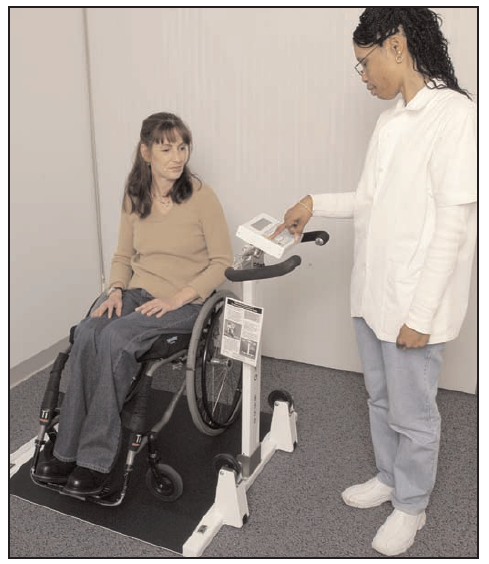3.1 Getting Weighed
Accessible scales are important to quality health care for people with disabilities. An accessible scale allows a wheelchair user to roll onto the platform of the scale. Someone who has poor balance, or who cannot step up, can walk on or sit on a chair on the scale platform.
Wheelchair user being weighed on accessible scale
The scale should have sturdy handrails, a high weight capacity (500+ lbs), and a slip-resistant platform. For more information on accessible scales and a list of manufacturers, look on the Internet at http://www.cdihp.org/briefs/brief2-weight-scales.html. You can use this document as a source of information for your health care provider.
Here are some reasons you can use to help your health care provider understand why having an accessible scale is important.
-
If your health care providers do not know your current and accurate weight, they may prescribe the wrong amount of medication for you.
-
Changes in weight can be important signs of health conditions.
-
Weight gain can be a sign of heart disease, high blood pressure, diabetes, reproductive problems and many other conditions.
-
Weight loss can be a sign of cancer, heart or digestive conditions, depression, and many other conditions.
-
-
If a health care office does not have an accessible scale, they must help people onto the scale, but this is not always possible for individuals with poor balance or who cannot stand.
-
When accessible scales are not available, patients may be unsafely assisted or lifted onto a standard scale. This type of assistance can also cause back or other musculoskeletal injuries to the medical facility staff.
-
An accessible scale benefits more than just patients who use wheelchairs. It can be used by anyone who has difficulty stepping up, balancing, standing on the small area of a standard scale or who may be too heavy to use a standard scale.
-
Accessible scales allow health care facilities to accurately obtain the weight of all patients and, therefore, comply with the ADA.
The national study of people with disabilities or activity limitations already mentioned found that 54% of 222 people with experience using weight scales had moderate or greater difficulty. Their issues included:
-
Standing scales may be unstable.
-
Scales have nothing to hold on to.
-
Scale displays are not usable by people with low or no vision.
Some survey respondents said they did not know their weight and had not been weighed in many years. Some reported that their health care providers often asked them to “guess” their weight, which was impossible.3
Maria had not been weighed in over 10 years, since the last time she had seen her doctor at the rehabilitation center. She had always just guessed her weight based on how her clothes fit her. But now she was pregnant and she knew that accurate measurement of her weight was an important part of her prenatal care. At first her doctor suggested that she go to the local rehab center, which was 10 miles away and arrange to be weighed there before each appointment.
This was not acceptable. It was a huge hassle (driving there, transferring in and out of the car, waiting, weighing, driving back, etc.) Maria mentioned that it would be helpful if the doctor got an accessible scale. Maria shared information on accessible scales at her next visit. She gave the same information to the office manager. Maria’s doctor agreed to purchase an accessible scale.
Maria was able to use the scale through her pregnancy. Awhile after the scale was purchased, her doctor commented that she had another patient who used a wheelchair that needed to use the scale and she also used the scale for an obese patient who couldn’t use the standard scale. It was quickly proving to be a worthwhile purchase for her office and helpful for many people, not just Maria. Actually the scale was used by all the doctor’s patients.
3 Kailes, J.I. (2006). The Patient’s Perspective on Access to Medical Equipment. In J. Winters and M. Story (Ed.), Medical Instrumentation: Accessibility and Usability Considerations (pp. 3-14). Boca Raton, FL: CRC Press.


User Comments/Questions
Add Comment/Question